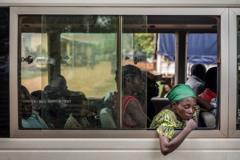In January, a Congolese refugee, known as Pacito, found himself homeless in Kenya with his wife and infant son after his U.S. resettlement flight was abruptly canceled. Just a day before their planned departure, the Trump administration suspended the refugee program, leaving thousands like him in a state of confusion and despair. Pacito, who had already sold his belongings and moved from his home, now struggles to find work, highlighting the harsh contrast between his plight and the expedited acceptance of white South Africans under new policies.
This change reflects a dramatic shift from previous policies facilitating the resettlement of refugees, as the Trump administration focuses on an "America First" agenda that has restricted migration routes and tightened deportation efforts. The administration's recent decision to allow Afrikaners—whom they claim are victims of "racial discrimination"—to enter the U.S. has drawn ire from refugees who had been preparing for their own chance at safety, having undergone the required vetting processes for years.
Pacito noted the "unfairness" of the situation, feeling stuck and unsure of his family's future, while numerous other refugees who also met the legal criteria for status face an uncertain fate. Critique has emerged from organizations advocating for refugees, stressing the need for equitable treatment across all demographics facing persecution.
The wider implications of these policies extend beyond individual stories, raising questions about the fairness of global refugee pathways. Even voices from conflict-ridden nations like the DRC and Gaza echo this sentiment, as refugees unable to reach the U.S. call attention to their struggles. Amjad Hammad, a Gaza resident, expressed his bewilderment about the prioritization of South African refugees over those facing dire conditions in Palestine.
With fears of returning to violence, many refugees are left grappling with homelessness and food insecurity, as they await answers in a climate marked by increased isolationism and reduced global engagement. The stark contrast in refugee treatment continues to deepen their frustrations and fears, as the uncertain future looms large in their lives.


















